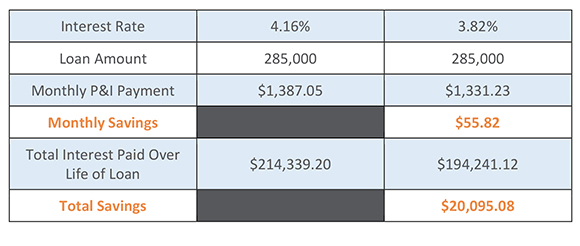Many transferees seek to buy a home in their new location, and will need to submit a relocation mortgage application. GMS recommends that companies should encourage transferees to buy a home instead of renting. Transferees who buy a home establish roots in their new community and can settle in more comfortably. Also, if a company offers home purchase benefits, this sends a strong signal of commitment on their part to the transferee.
What is a Relocation Mortgage?
A relocation mortgage is an alternative mortgage product. Transferees may be eligible for benefits that will help them move and purchase a home. In some cases, employers may contribute subsidies to help cover the costs of closing. They may help transferees obtain a lower interest rate on the mortgage by paying an upfront fee, also known as paying for points.
GMS spoke with Anthony Hughes, Relocation Account Manager at Quicken Loans. Anthony agreed to share his advice and guidance for transferees who need to submit a relocation mortgage application.
Top 5 Questions for Transferees Who Plan to Submit a Relocation Mortgage Application
Anthony highlights 5 major questions that transferees must address when they are working with the dedicated team of VIP relocation mortgage bankers at Quicken Loans. Answers to these questions will provide information that is helpful for the mortgage process.
By knowing the transferee’s answers to these questions, it will help ensure the team at Quicken Loans is setting proper expectations for them from the first call through closing. Anthony states that Quicken Loans’ goal is for each transferee’s mortgage experience to be as seamless and stress free as possible during their relocation.
Relocation Mortgage Application Top 5 Questions
Question #1: Employment
- Are you a new hire? Transferring internally? Did you get a promotion?
- What is your start date for your new role, what is your new role, and how much will your new income be?
- Do you have an offer letter available to provide us?
Question #2: Timeline/Goals/Awareness
- Have you relocated before?
- When are you looking to have everything finalized?
- Do you have a timeline in place?
Question #3: Departure Home versus Destination Home
- What are your plans with your current home?
- Do you need to sell your current home to have the funds to qualify for your new mortgage?
- Do your benefits include a Guaranteed Buyout Option (GBO) or Buyer Value Option (BVO) that will impact your relocation mortgage application?
- How much are you looking to spend on your new home?
- Are you familiar with the real estate market in the new area?
Question #4: Assets
- What assets do you have on hand?
- What are your account balances?
- Where are the funds coming from for your new home purchase? Proceeds? Equity advance? Cash on hand? Gift?
Question #5: Credit Report
- What is included in the credit report?
- What is your score?
- Could we utilize dedicated down payment funds in a better way?
Reviewing the Answers on the Relocation Mortgage Application
Anthony shares that once Quicken Loans has reviewed these top 5 questions with a transferee, the team will provide them with details around the Quicken Loans Mortgage First program. This program enables Quicken Loans to fully underwrite the transferee’s loan prior to their first house hunting trip. Quicken Loans’ Mortgage First approval is stronger than just a traditional pre-qualification. As a result, this approval can give transferees the upper hand when making an offer on a new home.
What Does This Mean?
Transferees who want to submit a relocation mortgage application to buy a new home should review their current financial arrangements with a qualified lender. Anthony states that Quicken Loans has several informative guides to help transferees understand the relocation mortgage application process, including a “Do’s and Don’ts of Relocating to a New Home” flyer. Transferees who have a mortgage on their current home may be able to obtain another mortgage for a new home. However, this depends on their specific financial circumstances. Transferees should understand that they must be approved for the total amount of current mortgage debt and their new mortgage loan.
What Should Employers do for Transferees Who Want to Submit a Relocation Mortgage Application?
Employers with transferees looking to buy a new home should direct them to speak with qualified lenders and financial advisors for guidance. They should review their relocation policy to ensure their policy represents industry best practices and provides strong support for their talent acquisition program.
Employers should also work with an experienced and knowledgeable Relocation Management Company (RMC). By engaging the RMC early in the process, employers will be assured of all the important points that relate to the transferee’s ability to buy a new home and arrive to their new location on schedule.
Conclusion
Global Mobility Solutions’ team of domestic relocation experts has helped thousands of our clients understand how to communicate important points relating to how transferees should submit their relocation mortgage application. Our team can help your company understand how to proceed by providing guidance to transferees on obtaining important and timely information from qualified lenders and financial advisors.
GMS was the first relocation company to register as a “.com.” The company also created the first online interactive tools and calculators, and revolutionized the entire relocation industry. GMS continues to set the industry pace as the pioneer in innovation and technology solutions with its proprietary MyRelocation® technology platform.
New SafeRelo™ COVID-19 Knowledge Portal
GMS recently launched its new SafeRelo™ COVID-19 Knowledge Portal featuring a number of helpful resources including:
- Curated selection of news and articles specific to managing relocation programs and issues relating to COVID-19
- Comprehensive guide to national, international, and local online sources for current data
- Program/Policy Evaluation (PPE) Tool for instant relocation policy reviews
Contact our experts online to discuss how to provide guidance for a transferee in submitting their relocation mortgage application, or give us a call at 800.617.1904 or 480.922.0700 today.
GMS is sharing public knowledge and can help companies more clearly understand mortgage loans for transferees. However, GMS is not a CPA firm or a lender, and is not giving financial advice. Everyone’s financial situation is different; individuals and employers should consult their lenders and financial advisors prior to making any decisions.
We're Here to Help! Request a Courtesy Consultation
Are you ready to talk to a Mobility Pro? Learn how GMS can optimize your mobility program, enhance your policies to meet today’s unique challenges, receive an in-depth industry benchmark, or simply ask us a question. Your Mobility Pro will be in touch within 1 business day for a no-pressure, courtesy consultation.



